- Home
- Gordon Korman
Collision Course Page 9
Collision Course Read online
Page 9
Ice … the berg …
“Jack the Ripper!” he exclaimed, sitting up suddenly. “Where did he go?”
“He limped off. Oh, Alfie, you were so right! He tried to kill me!”
Alfie shook his head to clear it. “This time he’s well and truly caught. The Titanic isn’t Whitechapel, where he can disappear down a sewer. And tonight we have a live witness.”
Sophie nodded feelingly. “It’s a lucky thing that iceberg came along, or he would have finished the both of us!”
Alfie took stock of their surroundings. Blocks and chips of ice lay strewn about the forecastle. “I thought there would be more,” he commented. “I felt the whole ship shake.”
“I’ve read that the bulk of an iceberg is underwater,” Sophie put in. “Maybe most of the shaking took place belowdecks.”
Alfie looked worried. “I think I should go down and check on my da.”
“But what about Jack the Ripper?” Sophie protested in a voice writhing with anxiety. “He’s loose on the ship! We have to tell the officers before he attacks somebody else!”
“Come with me as far as E Deck,” Alfie decided. “That’s Scotland Road. There’s always a lot of crew around. Someone will know what to do.”
They descended to the well deck and reentered the forecastle to the spiral staircase.
“Listen,” Sophie urged.
Alfie paused. “I don’t hear anything.”
“That’s just it. From the moment we left Southampton, the thrum of the engines was as natural as your own heartbeat. Now it’s stopped. You don’t suppose anything’s really wrong, do you?”
Alfie quickened their pace on the metal stairs. “My father will know. He’s worked on ships all his life.”
As they approached E Deck, the hustle and bustle of Scotland Road reached their ears. If anything, it seemed more active than usual to Alfie. “I’ll come find you once I’ve spoken with my da.”
She started to go, then turned to him, eyes huge. “Alfie, you saved my life.”
“And you saved mine right back,” he told her. “I’ll see you soon.”
He continued down, hurrying now, the silence of the engines preying on his mind. Now he was aware of a cold, damp wind rising from below. Why had he never noticed that before?
As he neared the bottom, an appalling sight met his unbelieving gaze. Dark water swirled at the base of the staircase. Shocked, he climbed back up to F Deck and threaded his way aft to the ladder access to the boiler rooms.
As he descended, unimaginable chaos enveloped him. The wind was even stronger, only here it churned thick with steam and smoke. The stokers, some drenched from head to toe, splashed around in knee-deep water. And the noise was unavoidable — a cacophony of urgent bellowed instructions to “Shut the dampers!” “Man the pumps!” and “Don’t let the water reach the furnaces!”
“Da!” It was no use. Alfie’s shouts were lost in the pandemonium. He dropped to the deck, the frigid water soaking his thighs. It was so cold that it doubled his heartbeat, and raised his voice by an octave. “Da!”
He began to slog toward Number 5, jostled by the tumult of activity. Finally, an engineer recognized him and relieved John Huggins at a pump.
“Boy, you should be with your passengers!” His father’s voice was exhausted.
“What’s going on, Da?”
“She’s making water! We must have struck something — a smaller ship perhaps. That happened to the Olympic.”
Alfie shook his head. “It was an iceberg. But how would that create wind?”
“All this water coming in, it pushes the air up and out.”
The young steward regarded him in alarm. “Is the ship seriously damaged?”
“They say she’s unsinkable.” John Huggins looked grim. “It looks like we’re going to find out. Now, get to your passengers. Rich ladies don’t like to be disturbed in the middle of their beauty sleep.”
“I won’t leave you here!” Alfie protested.
“I’ve a job to do, lad — and so have you. Go!”
Halfway up the access ladder, Alfie turned, irresistibly drawn back to his father. John Huggins was on the pump once more, manning his post as he always had. As a breadwinner, he’d provided neither wealth nor luxury, only long lonely absences that had ultimately driven his wife away. Still, he was a father to be proud of, to admire. For some reason, Alfie had trouble tearing his gaze away.
No sooner had he set his feet on F Deck than he was nearly bowled over by a running figure. Struggling to stay upright, he recognized one of the clerks from the post office.
The young man was soaking wet and distraught. “The mail room is swamped!”
Alfie was shocked. How could that be? The mail was sorted on G — just a deck below where they were now. “How much water?”
“The packages are floating!”
“The captain must be informed!” Alfie exclaimed.
“Informed of what?” came a calm voice from behind them. Fourth Officer Boxhall approached, his sharp eyes taking note of their dripping uniforms and frantic expressions.
“Four feet of water in the mail room, sir!” the clerk gasped. “And it’s worse farther forward! Escaping air has blown the hatch off the forepeak tank!”
“Move as much of the mail as you can up to F Deck,” Boxhall ordered. To Alfie, he said, “Put on dry clothing before seeing to your passengers. We don’t want any rumors that something is amiss.”
“But” — Alfie could scarcely believe his ears — “something is amiss!”
The fourth officer smiled thinly. “Don’t be absurd, lad. Nothing is amiss until the captain says it is.”
CHAPTER TWENTY
RMS TITANIC
SUNDAY, APRIL 14, 1912, 11:45 P.M.
To Juliana in stateroom B-56, the collision had felt like a gentle scrape — merely a brief interruption in the ship’s smooth progress. Moments later, there was a stir of voices in the passageway — polite questions from the first-class passengers and reassuring replies from their stewards.
“There’s talk of an iceberg, miss,” Junior Steward Tryhorn told Juliana. “I’m sure they’ll get it sorted out soon enough.”
Most went back to bed, but a few intrepid souls wrapped themselves in overcoats and ventured out to see if they could catch a glimpse of this Atlantic novelty.
By the time Juliana made it up to the A-Deck promenade, there was no berg to be seen. But looking down, she could tell that the well deck and forecastle were littered with ice fragments. A few young tuxedo-clad first-class men had organized an impromptu football match with the larger chunks, and were creating quite an uproar in their mirth. The scene reminded her of stories she had heard of Papa in his youth — mindless, impulsive, devoted to fun. So little had changed, except that the money had run out.
It was as she returned to her suite that she encountered Alfie — drenched and disheveled. His appearance was the first sign for Juliana that all might not be well aboard the Titanic.
“Alfie — why are you wet?”
“I’m not supposed to alarm the passengers —” he babbled. “I’ve been ordered to change my clothes —”
“Does this have anything to do with the iceberg?”
“We’re damaged, Miss Julie. Badly, I fear!”
“But it was only a little bump!”
“Up here, maybe,” Alfie said urgently. “I’ve been to see my da in the boiler rooms. They’re pumping like mad, but the water’s still rising. Up to G Deck in the mail room!”
Juliana went suddenly white. “Where’s Paddy right now?”
“The master-at-arms’ office — E Deck.”
“If water can reach G, it can go up to E!”
Alfie nodded. “But if there was any sign of water in the brig, I’m sure they’d move the prisoners….”
Their eyes met. In that kind of emergency, would the Titanic’s crew have time to worry about prisoners? Or even remember the hapless souls locked in the cells, unable to move to a hig
her place?
“We have to see if everything is all right down there,” Juliana insisted.
“I’m supposed to attend to my passengers….” Alfie began.
“I’m one of your passengers,” she insisted. “I’m going to check on Paddy.”
For five days, an army of crew members had broken their necks to cater to Sophie’s every whim. Now, with a killer on the loose, she couldn’t find anyone to pay attention to her.
There was an abundance of crew, all of them hurrying somewhere, most of them ignoring her. A few of the kinder ones promised to seek her out and speak with her later.
“But there’s a murderer on board!” she protested when Third Officer Pitman brushed her off like so many others had.
He turned and regarded her in astonishment. “My dear young lady, it was an iceberg!” And he, too, rushed away.
Members of the black gang, soaked and even grimier than usual, kept climbing up from the depths of the ship, seeking out officers. High above, the mighty smokestacks began to blast their mournful foghorn calls. It wasn’t so loud on Scotland Road, but on deck, it must have been earsplitting.
“Why are we blowing that horn?” she asked. “Is there another ship too close to us?”
“Just letting off steam, miss,” one of the stokers called. “Pressure got too high with the engines stopped.”
As she turned away, she collided with a steerage passenger who was sprinting at top speed along the passageway.
“Sorry, miss!”
He helped her up, and Sophie realized that she recognized the young man. In fact, she had danced with him at the third-class party the night before.
“Where are you going in such a rush?”
Aidan Rankin regarded her as if she were feeble-minded. “Didn’t you feel it? One of the boilers must have exploded!”
“We struck an iceberg,” Sophie explained. “I noticed it, too. It was just a little scrape.”
“Little scrape? Threw me right out of my berth, it did! Knocked me silly! And when I came to myself, there was water on the deck! I think we’re sinking!”
“The Titanic is unsinkable,” she tried to soothe.
“I’ve got to find Ma and my brothers!” And off he ran down Scotland Road.
A creeping unease began to take hold of Sophie — a gnawing sense that there might more peril hanging over her than the danger posed by Jack the Ripper. She decided to head back to first class and her mother. Amelia Bronson was no sailor, but she always took charge in a crisis.
Sophie rushed to the nearest staircase, took one step, and froze. Something was not right. It was almost as if the step had been moved — tilted ever so slightly forward. Yet that was impossible. The staircase was a fixed unit. And it looked completely level.
Still, there was that odd sensation. Had the stressful events of this night affected her mind? It had to be. Why, the only way the stair could be skewed would be if the entire ship …
“Sophie!”
Juliana appeared at the landing, scampering down from the upper decks, Alfie hot on her heels.
“Is it just me, or is the angle of these steps wrong?” Sophie asked them.
“The bow is filling up with water,” Alfie supplied breathlessly. “Near to my waist in the boiler rooms, and entirely flooded forward of there!”
“Have you seen Paddy?” Juliana asked.
“Paddy? He’s in the brig, isn’t he?”
“We have to make sure he’s moved somewhere safe,” Alfie panted.
“But —” Sophie protested. “But the ship can’t sink!”
“That won’t help if the water’s over his head and he’s locked in!” Juliana argued.
Sophie took in the sight of Alfie’s drenched uniform. “There’s no water around here. I’ve seen wet people, but they all came up from below.”
Alfie put his finger to his lips for silence. The three listened carefully. They could hear the distant roar of the smokestacks, and the hubbub of conversation from Scotland Road. But there was another sound — quieter, but steady. Almost like a draining culvert during a heavy rainstorm.
He led the girls forward. The passageway jogged to starboard around what Alfie knew to be the Number 2 Hatch. Soon, they were passing through sailors’ quarters, all deserted. At this point, the full complement of crew had been called to duty by this emergency situation, which was — what? To man the pumps? What other duties might be required on an unsinkable ship?
The sound was louder now, more like a rushing river. They had reached the spiral staircase. Alfie looked down. The water sloshed around the cast-iron steps just a few feet below them. “My God, fifteen minutes ago it was still on the orlop deck!”
“It’s rising quickly!” Juliana quavered. “We must find the master-at-arms and convince him to move Paddy!”
“Not yet.” Alfie continued forward. Bulkheads began to curve inward as the ship’s architecture narrowed near the forepeak. The passageway ended at a heavy steel hatch. A sign declared this to be the quarters of the Titanic’s lamp trimmers.
He banged against it with his fist. “Hello? Is anybody there?”
No reply. Instead, a deep groaning sound came from the other side of the bulkhead. Definitely not human.
Alfie twisted the wheel that operated the door — there was a little resistance — until it clicked. Then he pushed.
The hatch wouldn’t budge.
The girls joined him, lending their slender shoulders to the task. It was as if some great weight were in the trimmers’ quarters, holding the door fast.
At last, the steel hatch swung inward and a torrent of water exploded from the other side.
CHAPTER TWENTY-ONE
RMS TITANIC
MONDAY, APRIL 15, 1912, 12:00 midnight
The violent flow washed over Alfie and the girls. The force took their feet out from under them and swept them along the passageway.
So great was their shock that they were carried thirty feet aft before realizing how cold the water was. Alfie slammed into a bulkhead and spread himself as wide as possible to spare the girls such a jarring impact. They slipped and slid around the bend until the torrent abated enough for them to regain their feet, sputtering and coughing. The flood ran along E Deck several inches deep.
“Paddy —” Juliana gurgled.
“Right!” Alfie gasped.
The three splashed their way to the master-at-arms’ office. Water was streaming in the open door. The two cells at the rear of the room were occupied — Paddy in one; Kevin Gilhooley and Seamus in the other. The sea was already at their ankles.
Gilhooley rattled the cage, bellowing for the master-at-arms in language the two young ladies had never heard in their lives.
“What’s going on?” Paddy demanded. “What did we hit?”
“An iceberg,” Alfie told him. “Where’s Master-at-Arms King?”
“The crash knocked him right out of his chair, it did. Ran off like he was shot from a cannon.”
“Cowardly git!” roared Gilhooley. “Leaving us here to drown!”
“But two big galoots throwing me overboard — that was fine and honorable!” Paddy retorted.
Sophie ran into the passageway. “Mr. King! Mr. King!”
There was no reply. The corridor was deserted, the inrushing sea pouring from the trimmers’ hatch. She ran for Scotland Road. Surely there would be crew there.
The thoroughfare was crowded, but not with sailors. The third-class single men, quartered near the bow, were moving aft, carrying their possessions in hastily assembled bundles.
“Is an officer among you?” she asked anxiously.
“Oh, dozens,” said one young Irishmen sarcastically. “And the bleeding Prince of Wales is there, too. Bailing, he is!”
An older man was kinder. “Don’t go that way, miss. The holds are swamped, and steerage, too!”
Sophie spun on her heel and raced back to the brig. Progress was slow now, and the fabric of her sopping dress was weighing her down. “N
o master-at-arms, no crew at all!” she reported, her voice sounding desperate. “Before you know it, E Deck will be underwater!”
Alfie began to rummage through King’s desk. “Where does Mr. King keep the keys?”
“On his belt, the fool!” growled Seamus.
“But surely there’s another set!” Juliana persisted.
“Stand back!” ordered Alfie. He picked up the wooden chair, which had begun to float, and aimed a mighty blow at the door of Paddy’s cell. The chair shattered, but the lock held.
“Find a fire ax!” cried Sophie, shivering as the water rose past her knees.
“We don’t need it!” Paddy exclaimed urgently.
“What are you going to do?” cried Juliana, panic-stricken. “Wish yourself out?”
“Give me your hairpins!” Paddy ordered the girls.
“Our hairpins?”
Alfie thought back to his friend breaking into the Astors’ trunk. For Paddy, a hairpin was as good as a key. “Do it!” he urged.
Without hesitation, both girls produced an assortment of pins in varying shapes and sizes, paying little attention as their upswept hair cascaded down around their shoulders.
Instantly, Paddy was all concentration. He selected a long gold pin and a short, flatter piece in mother-of-pearl. Pressing his face against the bars, he reached his fingers out of the cell, inserted his “tools” into the lock, and went to work, the muscles of his hands undulating beneath his skin.
Juliana’s teeth began to chatter as the water swirled at her waist. “You’ll never manage it!”
Despite the pressure, Paddy cast her a cheeky grin. “I may not be an accomplished gentleman, miss, but this is what I do.”
There was a loud click and the door swung wide. Paddy sloshed out into the room.
“You haven’t seen the last of me, wharf rat!” Gilhooley shouted from the other cell. “You’d best keep looking over your shoulder! Even if I die, remember, you’ll die, too, one day! And I’ll be waiting for you in hell!”
The threat was still echoing in their ears as they waded into the passageway.

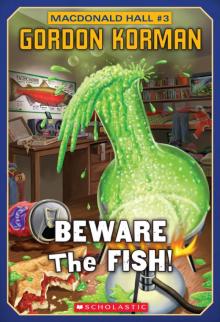 Beware the Fisj
Beware the Fisj Slacker
Slacker The Medusa Plot
The Medusa Plot This Can't Be Happening at MacDonald Hall!
This Can't Be Happening at MacDonald Hall!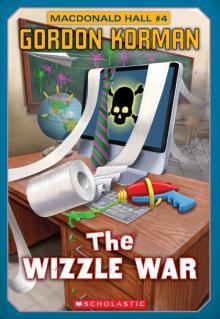 The War With Mr. Wizzle
The War With Mr. Wizzle The Emperor's Code
The Emperor's Code Zoobreak
Zoobreak The Danger
The Danger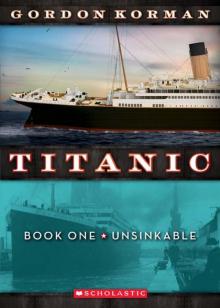 Unsinkable
Unsinkable Jake, Reinvented
Jake, Reinvented No More Dead Dogs
No More Dead Dogs The Stowaway Solution
The Stowaway Solution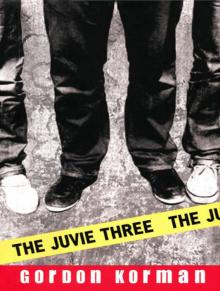 The Juvie Three
The Juvie Three The Climb
The Climb Criminal Destiny
Criminal Destiny Hideout: The First Adventure
Hideout: The First Adventure Flashpoint
Flashpoint Swindle
Swindle Pop
Pop The Rescue
The Rescue Memory Maze
Memory Maze The Sixth Grade Nickname Game
The Sixth Grade Nickname Game Vespers Rising
Vespers Rising Collision Course
Collision Course The Abduction
The Abduction Losing Joe's Place
Losing Joe's Place The Dragonfly Effect
The Dragonfly Effect The Hypnotists
The Hypnotists Survival
Survival Lights, Camera, DISASTER!
Lights, Camera, DISASTER! Payback
Payback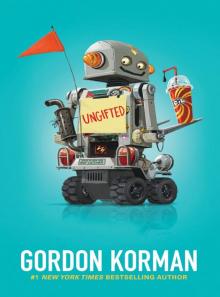 Ungifted
Ungifted Unplugged
Unplugged Framed
Framed Supergifted
Supergifted Masterminds
Masterminds Jackpot
Jackpot Don't Care High
Don't Care High The Deep
The Deep Go Jump in the Pool!
Go Jump in the Pool! The Contest
The Contest Public Enemies
Public Enemies Hideout: The Second Adventure
Hideout: The Second Adventure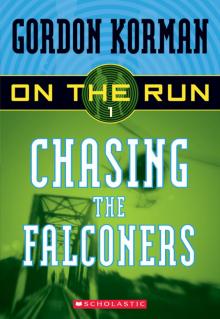 Chasing the Falconers
Chasing the Falconers One False Note
One False Note Shipwreck
Shipwreck Jingle
Jingle Unleashed
Unleashed Son of the Mob
Son of the Mob Now You See Them, Now You Don't
Now You See Them, Now You Don't War Stories
War Stories Schooled
Schooled Hunting the Hunter
Hunting the Hunter The Zucchini Warriors
The Zucchini Warriors A Semester in the Life of a Garbage Bag
A Semester in the Life of a Garbage Bag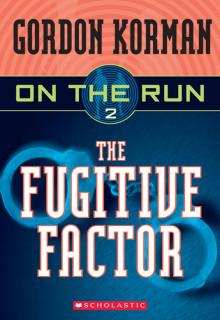 The Fugitive Factor
The Fugitive Factor Born to Rock
Born to Rock The Summit
The Summit Showoff
Showoff The Unteachables
The Unteachables The Third Adventure
The Third Adventure The Joke's on Us
The Joke's on Us Linked
Linked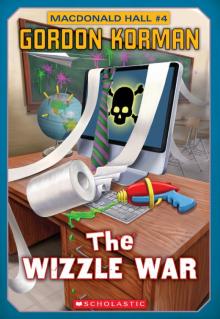 The Wizzle War
The Wizzle War The 6th Grade Nickname Game
The 6th Grade Nickname Game The Second Adventure
The Second Adventure The First Adventure
The First Adventure![39 Clues : Cahills vs. Vespers [01] The Medusa Plot Read online](http://i1.bookreadfree.com/i2/04/10/39_clues_cahills_vs_vespers_01_the_medusa_plot_preview.jpg) 39 Clues : Cahills vs. Vespers [01] The Medusa Plot
39 Clues : Cahills vs. Vespers [01] The Medusa Plot